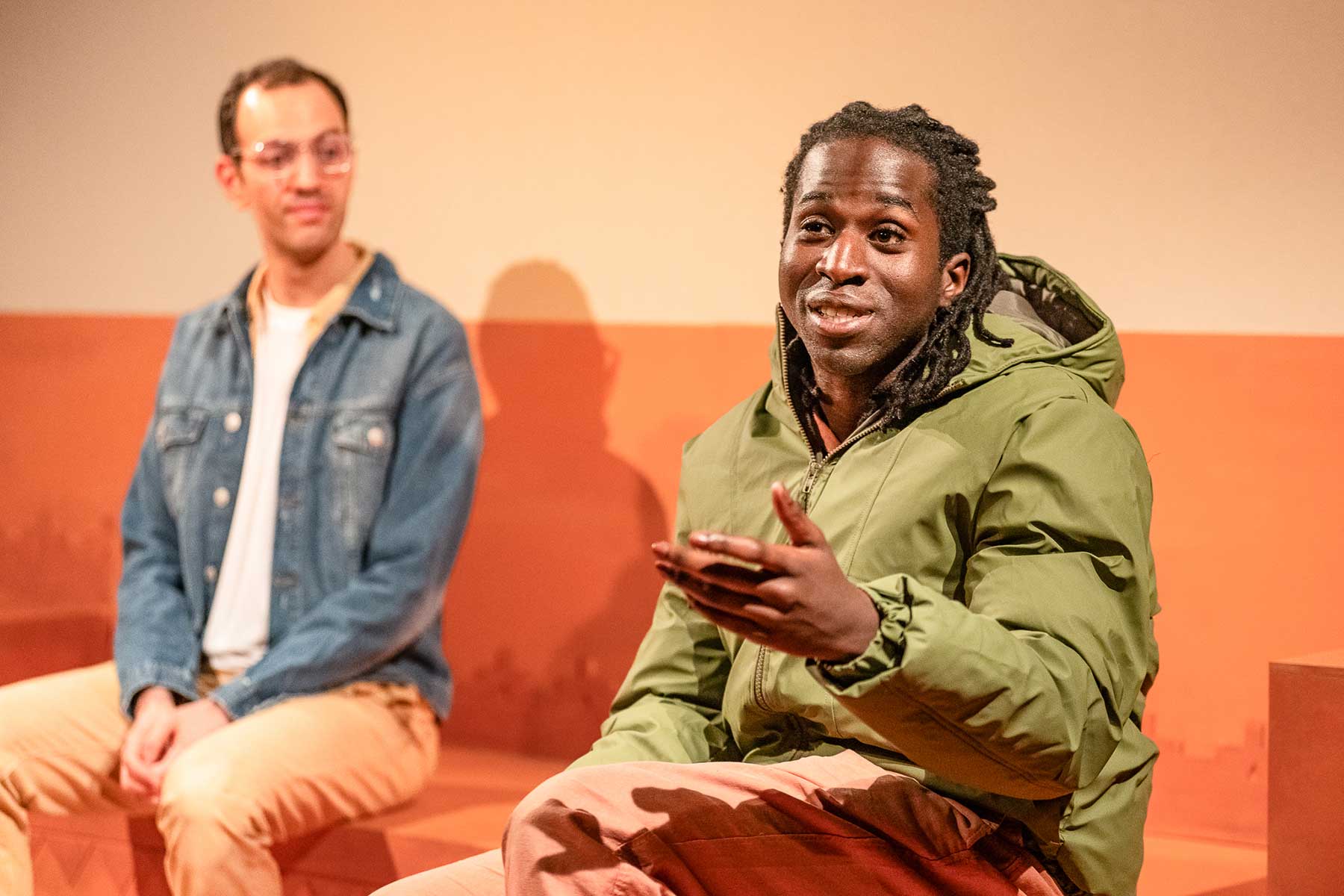
How do you stage a play about one man’s epic journey from Guinea, across a vast stretch of Africa, all the way to Europe and do it on the compact stage of the 70-seat Jermyn Street Theatre? It might seem an impossible task yet director Stella Powell-Jones not only pulls it off but delivers a vivid, emotionally resonant production that feels at both deeply personal and universally powerful.
In an age saturated with headlines about migrants and refugees, Little Brother arrives as a timely piece of theatre. It tells the true story of Ibrahima Balde (Blair Gyabaah), a young man who set out to find his missing brother and ended up enduring a harrowing journey. Balde recounted his experience to Basque poet Amets Arzallus Antia, who co-authored the bestselling book Little Brother, now adapted for the stage by Timberlake Wertenbaker and receiving its premiere at Jermyn Street.
The production opens with Amets (Youness Bouzinab) setting the scene, recounting his first encounter with Ibrahima outside a train station on the border between Spain and France. They strike up a conversation and when Amets asks about his past, Ibrahima replies, “Mon frère, la vie c’est pas facile à dire” (“My brother, life is not that easy to tell”). Yet tell it he does and what unfolds is a remarkable story of courage, resilience and determination, revealing both the best and worst of humanity.
After the sudden death of his father, Ibrahima leaves home to find work and support his family. When he learns that his younger brother has also left, but he is attempting the dangerous journey to Europe, Ibrahima vows to find him and bring him back. What follows is a perilous trek along treacherous migrant routes, where he confronts human traffickers, inhospitable terrain and the ever-present threat of death. His journey is not only physical, it’s also deeply emotional, highlighting the strength of the human spirit in the face of unimaginable hardship. Along the way, he also encounters moments of unexpected kindness from fellow travellers and strangers who offer food, shelter, transport and money.
At the heart of this production is a commanding performance by Blair Gyabaah, who is simply outstanding as Ibrahima. Whether delivering extended monologues or responding with quiet restraint to acts of cruelty and compassion, he holds the audience’s attention with a calm dignity. The intimacy of the Jermyn Street Theatre, its limited capacity and close proximity between actors and audience allows Gyabaah to make direct eye contact with audience members drawing us into Ibrahima’s world, making the story feel immediate, personal, and profoundly moving.
The supporting cast, Whitney Kehinde, Ivan Oyik, Mo Sesay and the aforementioned Youness Bouzinab, expertly take on multiple roles, slipping in and out of characters with seamless agility. They convincingly portray everyone from Ibrahima’s family members to the many strangers he meets along the way, giving voice and form to the diverse range of humanity he encounters on his journey.
Natalie Johnson’s set design is minimalist but highly effective. It consists of just a few orange steps positioned between two doorways on either side of the stage. With subtle shifts in lighting and sound, the space transforms to represent the many locations along Ibrahima’s journey. This pared-back approach ensures that the focus stays firmly on the performances. Complementing the visuals is original music by Guinean artist Falle Nioke, which adds an authentic and emotionally resonant layer to the production, enriching the storytelling with cultural depth.
In the intimate setting of the Jermyn Street Theatre, Little Brother tells a big story, compassionate, beautifully acted and superbly directed. At a time when migration is too often reduced to numbers and met with hostility, this production reminds us that behind the statistics are real people, with real, often desperate reasons for leaving their homes in search of safety and hope. Little Brother is an important play that deserves to be seen.































